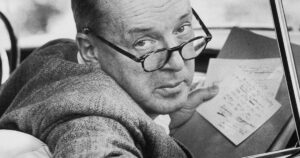Sara Karpukhin’s article “Looking for the Human in the Humanities: Vladimir Nabokov’s Theory of Literary Evolution” was published in the Slavic and East European Journal’s Spring 2023 issue. We interviewed Dr. Karpukhin to find out more about her research.

What aspects of Nabokov’s literary evolution do you focus on in this article- and why these?
First of all, thank you for your interest in my work! I think of such conversations as opportunities to create a sense of context and a sense of community, and I’m grateful for both.
In the article, I talk about Nabokov’s views on evolution in literature, specifically his idea that across centuries writers learn to see and describe colors better. It’s a fascinating subject for several reasons.
First, it shows Nabokov’s interest in applying the Darwinian theory of evolution to his literary practice, a daring thing to try for a mid-20th-century intellectual and a curious precursor to today’s evolutionary literary criticism. As it happens, Nabokov’s biographer Brian Boyd is one of the experts in the field but his attempts to situate Nabokov in it have been polemical, controversial, and I wanted to know why.
Secondly, when I looked closer at Nabokov’s statements, I noticed that his interpretation of evolution, both natural and literary, prioritized the individual, even to the point where the individual remained free from most rationalizable constraints, historical or biological. It was as if Nabokov invoked the prestigious language of science in order to hijack it and use it to advocate for the one thing that this language has historically threatened o ignore or even deny, individual agency.
It turned out in my final analysis that there were considerable personal stakes in Nabokov’s theorizing: he was advocating for himself as an artist, his own freedom in a world overdetermined by impersonal rationalist forces.
What does your research tell us about Nabokov as a literary theorist? How does Nabokov’s theory of literary evolution as you outline it fit in with the interpretive traditions in scholarship on Nabokov? There are broad questions, and everyone should read the article for all the details, but maybe you could give us some general ideas here about you go about answering them in the article?
I think one takeaway is that we can take Nabokov seriously as a literary theorist. He had his own complex philosophy and engaged with other intellectual traditions at a profound level. When he reviled Marxism and Russian Formalism and the assorted-isms of academic literary studies in the US, he know what he was dealing with and had his own positive conception of personhood in mind. Even when he contradicted Darwin and rejected a species-based interpretation of evolution, he wasn’t being a pure contrarian- he was fighting for something real that can be expressed in historical terms, even though he himself preferred not to express it.
Now, with regards to English and Russian literary studies, they differ in the ways in which they conceptualize history, and as far as I know there have even few attempts to build a methodological bridge between them. This divide struck me as rather Cold-War in nature, especially when it came to Nabokov scholarship and the writer’s shift from Russian to English.
This state of affairs didn’t reflect my historical perspective and the aspects of Nabokov’s legacy that I found important. I saw Nabokov as an outsider in Marxist and Russian Formalist conceptions of literary history- as well akin American academic conceptions of it. I wanted to recognize Nabokov’s stakes, his own life-long personal war of conceptual survival as an immigrant writer.
It seemed to me that both Russian-and-English-specific Nabokov scholarship has consistently avoided examining its own motives and by extension consistently overlooked trauma and repair as possible creative and interpretive motives. I wanted to gently push in that direction, if only to shed some light on-and offer as a worthy object of intellectual and pedagogical attention-Nabokov’s truly remarkable achievement in finding reparative uses for art.
We know you’re working on a broader project to reframe how Nabokov is read and taught. Does this article fit into that broader project and, if so, how?
Absolutely. This article deals with Nabokov’s immigrant experience, the ways in which displacement affected his thinking and, to a lesser extent, his artistic practice. In my own mind, it’s part of a larger project that I call Queer Nabokov. The Slavic Literature Pod recently published my conference paper where I talk about “difference” as an important element in Nabokov’s identity making art.
I try to learn from the social sciences and adjacent fields such as philosophy. I find the feminist critique of the “god trick” of science, the concept of situated knowledges in epistemology, as well as the reflexive turn in sociology and anthropology particularly inspiring. The researcher can see more and differently when they consistently question their own relation to the subject of position compared to others (if anything, it can create a deeper sense of uncertainty), but it’s a different one, and I’m excited when colleagues and students show interest in this kind of work. Ultimately, if my approach resonates with other people, it’s worth pursuing.